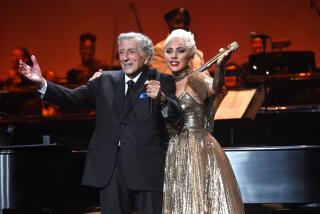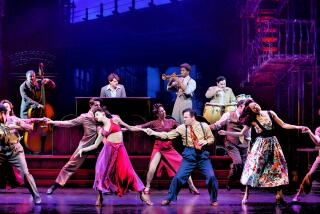STAGE REVIEW : A Fake Sinatra Can’t Go Home in ‘Lamppost Reunion’ : Fictionalized account of ‘Ol’ Blue Eyes’ returning to visit boyhood friends bogs down in trite O’Neill-isms.
- Share via
If it does nothing else, Louis LaRusso II’s “Lamppost Reunion” gives new meaning to the phrase, “Ol’ Blue Eyes is back.”
Gregory Bach’s Court Theatre production revives a play that is strangely nervy, fictionalizing the life of Frank Sinatra into that of Fred Santora, and imagining what might happen if Fred/Frank went back home to Hoboken to check up on his old boyhood pals. Any playwright treading this subject is in serious thin ice territory (what, one has to wonder, did Sinatra think of this?), and LaRusso deserves some kind of dramatist’s Purple Heart for even daring it.
That isn’t to say that “Lamppost Reunion” deserved a best play Tony nomination in 1975 (it lost to “Travesties”). During that time, Sinatra’s career was at an all-time low ebb, his star seemingly permanently eclipsed by a transformed American pop music business. His subsequent resurgence as a living myth and grandmaster could hardly be imagined then. In LaRusso’s mind, Fred/Frank was the stuff of tragedy, the fallen king.
LaRusso’s imaginative powers, though, seemed to have ended with the Sinatra-as-fiction idea. The framework for his play is a corny rehashing of O’Neill’s barroom walpurgisnacht (the action, of course, begins at 3:30 a.m.).
Fred (Robert Miano) has just played Madison Square Garden, and the word is that he’s dropping by the Lamppost Bar. Mac (Ken Zavayna), the stereotypical drunken Irishman, and Tommy (Anthony Russell), his fellow drunken Italian, are looking forward to it. Biggie (Guy Christopher), the bar owner and Fred’s old singing partner, isn’t at all: he just wants to close up, as much to avoid a fight as to get some sleep .
We wonder why he doesn’t, and the play is already in trouble. Then, when Fred shows up, we wonder why Biggie doesn’t kick him out. Whatever happened to “We Reserve the Right to Refuse Service to Anyone”?
The ball, then, is in Fred’s corner, as he has to explain what he wants out of this little reunion. He can’t articulate it, making it the actor’s challenge to articulate what’s emotionally underneath. Miano simply drops the ball.
Bach’s show is all dressed up (a fine Raymond Dunker set, with good late night lights by Stephen J. Backo), but with ultimately nowhere to go. We’re locked in a bar with some guys drinking and spilling their memories and guts out, but the conflict is on a one-track course. It’s Biggie vs. Fred, and there’s no doubt that the former is going to get the latter to explain why he left his buddies behind in the dust.
The final revelations don’t deliver the flush of real emotional nakedness--precisely what LaRusso seems to have been building up to for nearly two hours. The cast, though they couldn’t be better physically (Zavayna reportedly put on 20 pounds for his role), generally can’t fill the vacuum left by the script’s inability to go for the jugular. Howard S. Miller as Fred’s assistant Jobby (Frank’s was called “Jilly”) does have an amusing catharsis as he releases years of pent-up disgust, but it’s not Jobby’s play. The real catharsis is somewhere else, and it never arrives on stage.
* “Lamppost Reunion,” Court Theatre, 722 N. La Cienega Blvd., on Thursdays through Saturdays, 8 p.m., Sundays, 2 and 7 p.m., until Dec. 23. $12-$17; (818-990-9270 or 213-837-3728).
More to Read
The biggest entertainment stories
Get our big stories about Hollywood, film, television, music, arts, culture and more right in your inbox as soon as they publish.
You may occasionally receive promotional content from the Los Angeles Times.









